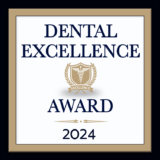
Whether you’re just beginning to notice signs of jaw discomfort or you’ve been dealing with TMJ for a while, understanding it can be the first step toward long-term relief.
What Is TMJ?
TMJ stands for temporomandibular joint, which is the hinge that connects your jawbone to your skull. You have one on each side of your jaw, and it plays a crucial role in allowing you to talk, chew, yawn, and move your jaw in different directions.
When there’s a problem with this joint or the muscles around it, it’s called TMD (temporomandibular disorder), although many people refer to the condition simply as TMJ. This disorder can cause a wide range of symptoms, some of which you might not even realize are related to your jaw.
Common Signs and Symptoms of TMJ
Everyone experiences TMJ differently, but here are some of the most frequently reported symptoms:
1. Jaw Pain or Tenderness
This is often the most obvious sign. You might notice pain in one or both sides of your jaw, especially when chewing or talking. The pain may also worsen when you’re stressed or clenching your teeth.
2. Clicking, Popping, or Grinding Sounds
If your jaw makes noises when you open or close your mouth, it could be a sign that the joint isn’t functioning smoothly. While some people experience these sounds without pain, clicking accompanied by discomfort is a red flag worth evaluating.
3. Difficulty Opening or Closing the Mouth
Some patients feel like their jaw “locks” or becomes stuck, either open or closed. This can be alarming and may interfere with eating or speaking comfortably.
4. Earaches or Ringing in the Ears (Tinnitus)
Because the TMJ is located near the ears, issues with the joint can sometimes mimic ear-related problems, such as aches, pressure, or even ringing.
5. Headaches or Migraines
Many patients with TMJ experience frequent headaches, especially around the temples or forehead. These can sometimes be misdiagnosed as tension or sinus headaches.
6. Facial Pain or Fatigue
TMJ disorders can lead to sore facial muscles, especially after chewing or speaking for long periods. Some people even notice pain that radiates to the neck or shoulders.
7. Tooth Sensitivity or Changes in Bite
Some people notice increased tooth sensitivity without a clear dental reason. TMJ can cause subtle changes in your bite, which can lead to uneven pressure on your teeth.
What Causes TMJ?
There’s no single cause of TMJ, but some common contributing factors include:
- Teeth grinding or clenching (bruxism).
- Arthritis in the joint.
- Jaw injury or trauma.
- Misaligned bite or orthodontic issues.
- Chronic stress, which leads to muscle tension.
Many of these factors can worsen over time without intervention, which is why early diagnosis is key.
TMD Treatment Options: What You Can Do
The good news is, you don’t have to live with jaw pain. At Shorewood Family Dental Care, we offer a variety of personalized solutions depending on your specific symptoms and lifestyle.
1. Custom Night Guards
If you grind or clench your teeth at night, a custom mouth guard can help protect your teeth and reduce stress on the jaw joint. Unlike over-the-counter versions, our night guards are made to fit your bite precisely for maximum comfort and effectiveness.
2. Bite Adjustments and Orthodontic Evaluation
If your TMJ issues stem from a misaligned bite, we may recommend adjustments or an orthodontic consultation to help redistribute bite forces and alleviate strain on the jaw.
3. Physical Therapy and Jaw Exercises
Certain exercises can strengthen and relax the muscles around your jaw, helping to reduce pain and improve mobility. We often work with patients to teach them these techniques, or refer them to a trusted physical therapist when necessary.
4. Stress Management Techniques
Since stress is a major contributor to TMJ, incorporating relaxation techniques like breathing exercises, stretching, and mindfulness can go a long way. We’re always happy to talk with you about lifestyle changes that can reduce tension in your jaw and body.
5. Botox® for TMJ Relief
In some cases, Botox injections can be used to relax the overworked muscles contributing to TMJ pain. This treatment is safe, quick, and has helped many of our patients find significant relief—especially those who haven’t responded well to other conservative treatments.
When to Seek Help
If you’ve been experiencing jaw discomfort, headaches, or any of the symptoms mentioned above, it’s important not to ignore them. Left untreated, TMJ can worsen over time and begin to affect your daily quality of life.
At Shorewood Family Dental Care, we take a comprehensive approach to diagnosing and treating TMJ. Our experienced team will carefully evaluate your symptoms, take detailed images if needed, and create a personalized treatment plan designed for lasting relief.
Let’s Get You Back to Comfort
Living with TMJ pain can be frustrating, but you’re not alone—and you don’t have to suffer in silence. At Shorewood Family Dental Care, we’re committed to helping patients not only achieve healthy smiles, but also lead more comfortable lives.
If you’re ready to address your jaw pain or just want to learn more about your options, schedule an appointment with our team today. Relief could be just one visit away.




